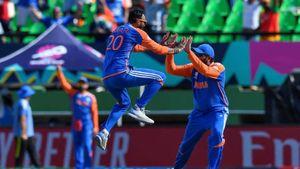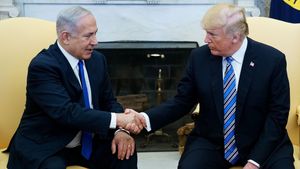The Democratic Republic of Congo (DRC) has issued urgent calls to major European football clubs, including Paris Saint-Germain (PSG), Arsenal, and Bayern Munich, urging them to sever their sponsorship ties with Rwanda as escalated conflict continues to engulf the eastern region of the Congo.
Thérèse Kayikwamba Wagner, the DRC's Foreign Minister, expressed serious concerns over the moral ramifications of these sponsorship agreements, particularly following the recent seizure of Goma, the largest city in eastern Democratic Republic of Congo, by M23 rebels. The DRC accuses the Rwandan government of providing support to these insurgents, exacerbated by the backdrop of accusations over the commodifying of conflict through sponsorships deemed controversial.
Wagner's letter to PSG questioned whether the funds from their partnership with Rwanda might be linked to revenues generated from minerals illegally smuggled from the DRC. "Are you certain the money from blood minerals is not financing your sponsorship contract?" Wagner asked pointedly, citing the troubling reality of what she called the “blood-stained sponsorship.”
The sponsorship deals with Rwanda, part of the broader ‘Visit Rwanda’ campaign, have come under scrutiny as the DRC government points fingers at how the money exchanged may obscure the reality of resource exploitation and humanitarian crises triggered by the relentless conflict. With the UN estimating over 400,000 displaced individuals since the beginning of the year, the stakes for those affected are staggering.
The M23 rebels, reportedly equipped and trained with Rwandan backing, stood at the epicenter of this turmoil, and their recent advances have intensified international scrutiny on Rwanda's intentions. Wagner pointed out the “culpability” of the Rwandan government, which, alongside the DRC accusations, has sparked criticisms from various international bodies. "It is time Arsenal ended its blood-stained sponsorship deals with this oppressor nation," Wagner urged, reinforcing her stance with the weight of humanitarian concerns.
For their part, the clubs have yet to respond publicly to the outcry from the DRC government, which links growing humanitarian adversity directly to Rwanda’s military and financial operations entwined with the conflict. The reaction from the clubs remains tightly monitored, especially amid larger conversations around human rights and corporate accountability.
Simultaneously, the conflict has garnered attention from the European Union, with growing pressure on the bloc to reconsider its commercial agreements with Rwanda, particularly those connected to the extraction and trade of minerals. Belgium’s Foreign Minister, Bernard Quintin, articulated these concerns staunchly: "The international community must respond, because declarations have not been enough."
The EU's memorandum on sustainable raw materials has drawn ire from DRC authorities, who view it as complicit support of Rwanda’s activities amid chaos. The humanitarian crisis is brewing, with the people of Goma facing hunger and distress as relief efforts have ground to a halt.
Human rights advocates caution against what they label 'sportswashing,' characterizing Rwanda's extensive investment across sports sponsorship as efforts to mask its documented human rights violations. Wagner's comments highlighted the extensive economic backing Rwanda receives as comprising significant segments of its economy, only raising more flags on the morality of funding streams linked to exploitation.
While the Rwandan government has issued firm denials of wrongdoing, claiming their sponsorship deals are focused on reputation-building for tourism, the mounting accusations from the DRC have put nations and international businesses on alert. Public relations are increasingly challenged as the divide between sports and societal responsibility blurs even more.
The noted sponsorship deals worth millions across these clubs have led to tangible visibility for Rwanda but have become increasingly controversial as allegations of support for the M23 rebels continue to circulate and take root among international observers.
With mounting pressure on international corporate relationships with potentially implicated nations, various stakeholders are left pondering ethical dilemmas amid the proliferation of conflict-driven economics. The consequences of remaining indifferent to these pressing calls to action could resonate beyond the borders of the DRC, potentially leading to broader geopolitical tensions fueled by mineral interests and humanitarian needs.
The urgency surrounding the sponsorships and the resulting consequences of the DRC conflict demand scrutiny, with calls not only for political action but also for corporate accountability. Engaging these discussions at higher institutional levels may influence the future course of Rwanda's international affiliations, shaping its role on both the sporting and global stages.



